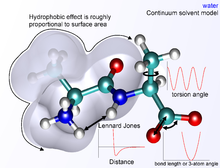Computational chemistry

Computational chemistry is a type of chemistry that uses computer science to help solve chemical problems. These programs help scientists learn about molecules and solids. Computational chemistry is often used with chemical experiments to get more information. It can predict chemical phenomena that have not yet been seen. It is widely used to design new drugs and materials.
Computational chemistry can predict the structure of molecules. It can help find where a molecule's atoms are. It can also find absolute and relative (interaction) energies, electronic charge distributions, dipoles and higher multipole moments, vibrational frequencies, reactivity or other spectroscopic quantities, and cross sections for collision with other particles.
Computational chemistry looks at both static and dynamic systems. In all cases, as the size of the system being studied grows, the computer time and other resources (such as memory and disk space) used also grows. That system can be a single molecule, a group of molecules, or a solid. Computational chemistry methods range from highly accurate to very approximate. Highly accurate methods are typically only for small systems.
Related pages[change | change source]
Other websites[change | change source]
- NIST Computational Chemistry Comparison and Benchmark DataBase Archived 2006-06-18 at the Wayback Machine - Contains a database of thousands of computational and experimental results for hundreds of systems
- American Chemical Society Division of Computers in Chemistry - American Chemical Society Computers in Chemistry Division, resources for grants, awards, contacts and meetings.
- CSTB report Mathematical Research in Materials Science: Opportunities and Perspectives - CSTB Report
- 3.320 Atomistic Computer Modeling of Materials (SMA 5107) Free MIT Course
- Technology Roadmap for Computational Chemistry Archived 2008-04-14 at the Wayback Machine
- Applications of molecular and materials modelling.
- Impact of Advances in Computing and Communications Technologies on Chemical Science and Technology CSTB Report
- MD and Computational Chemistry applications on GPUs
